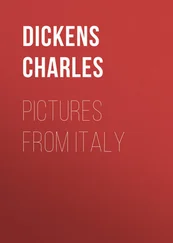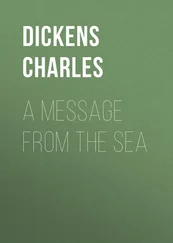Charles Dickens - Pictures from Italy
Здесь есть возможность читать онлайн «Charles Dickens - Pictures from Italy» весь текст электронной книги совершенно бесплатно (целиком полную версию без сокращений). В некоторых случаях можно слушать аудио, скачать через торрент в формате fb2 и присутствует краткое содержание. Жанр: Классическая проза, на английском языке. Описание произведения, (предисловие) а так же отзывы посетителей доступны на портале библиотеки ЛибКат.
- Название:Pictures from Italy
- Автор:
- Жанр:
- Год:неизвестен
- ISBN:нет данных
- Рейтинг книги:5 / 5. Голосов: 1
-
Избранное:Добавить в избранное
- Отзывы:
-
Ваша оценка:
- 100
- 1
- 2
- 3
- 4
- 5
Pictures from Italy: краткое содержание, описание и аннотация
Предлагаем к чтению аннотацию, описание, краткое содержание или предисловие (зависит от того, что написал сам автор книги «Pictures from Italy»). Если вы не нашли необходимую информацию о книге — напишите в комментариях, мы постараемся отыскать её.
Pictures from Italy — читать онлайн бесплатно полную книгу (весь текст) целиком
Ниже представлен текст книги, разбитый по страницам. Система сохранения места последней прочитанной страницы, позволяет с удобством читать онлайн бесплатно книгу «Pictures from Italy», без необходимости каждый раз заново искать на чём Вы остановились. Поставьте закладку, и сможете в любой момент перейти на страницу, на которой закончили чтение.
Интервал:
Закладка:
The Corso is a street a mile long; a street of shops, and palaces, and private houses, sometimes opening into a broad piazza. There are verandahs and balconies, of all shapes and sizes, to almost every house—not on one story alone, but often to one room or another on every story—put there in general with so little order or regularity, that if, year after year, and season after season, it had rained balconies, hailed balconies, snowed balconies, blown balconies, they could scarcely have come into existence in a more disorderly manner.
This is the great fountain-head and focus of the Carnival. But all the streets in which the Carnival is held, being vigilantly kept by dragoons, it is necessary for carriages, in the first instance, to pass, in line, down another thoroughfare, and so come into the Corso at the end remote from the Piazza del Popolo; which is one of its terminations. Accordingly, we fell into the string of coaches, and, for some time, jogged on quietly enough; now crawling on at a very slow walk; now trotting half-a-dozen yards; now backing fifty; and now stopping altogether: as the pressure in front obliged us. If any impetuous carriage dashed out of the rank and clattered forward, with the wild idea of getting on faster, it was suddenly met, or overtaken, by a trooper on horseback, who, deaf as his own drawn sword to all remonstrances, immediately escorted it back to the very end of the row, and made it a dim speck in the remotest perspective. Occasionally, we interchanged a volley of confetti with the carriage next in front, or the carriage next behind; but as yet, this capturing of stray and errant coaches by the military, was the chief amusement.
Presently, we came into a narrow street, where, besides one line of carriages going, there was another line of carriages returning. Here the sugar-plums and the nosegays began to fly about, pretty smartly; and I was fortunate enough to observe one gentleman attired as a Greek warrior, catch a light-whiskered brigand on the nose (he was in the very act of tossing up a bouquet to a young lady in a first-floor window) with a precision that was much applauded by the bystanders. As this victorious Greek was exchanging a facetious remark with a stout gentleman in a doorway—one-half black and one-half white, as if he had been peeled up the middle—who had offered him his congratulations on this achievement, he received an orange from a house-top, full on his left ear, and was much surprised, not to say discomfited. Especially, as he was standing up at the time; and in consequence of the carriage moving on suddenly, at the same moment, staggered ignominiously, and buried himself among his flowers.
Some quarter of an hour of this sort of progress, brought us to the Corso; and anything so gay, so bright, and lively as the whole scene there, it would be difficult to imagine. From all the innumerable balconies: from the remotest and highest, no less than from the lowest and nearest: hangings of bright red, bright green, bright blue, white and gold, were fluttering in the brilliant sunlight. From windows, and from parapets, and tops of houses, streamers of the richest colours, and draperies of the gaudiest and most sparkling hues, were floating out upon the street. The buildings seemed to have been literally turned inside out, and to have all their gaiety towards the highway. Shop-fronts were taken down, and the windows filled with company, like boxes at a shining theatre; doors were carried off their hinges, and long tapestried groves, hung with garlands of flowers and evergreens, displayed within; builders” scaffoldings were gorgeous temples, radiant in silver, gold, and crimson; and in every nook and corner, from the pavement to the chimney-tops, where women's eyes could glisten, there they danced, and laughed, and sparkled, like the light in water. Every sort of bewitching madness of dress was there. Little preposterous scarlet jackets; quaint old stomachers, more wicked than the smartest bodices; Polish pelisses, strained and tight as ripe gooseberries; tiny Greek caps, all awry, and clinging to the dark hair, Heaven knows how; every wild, quaint, bold, shy, pettish, madcap fancy had its illustration in a dress; and every fancy was as dead forgotten by its owner, in the tumult of merriment, as if the three old aqueducts that still remain entire had brought Lethe into Rome, upon their sturdy arches, that morning.
The carriages were now three abreast; in broader places four; often stationary for a long time together, always one close mass of variegated brightness; showing, the whole street-full, through the storm of flowers, like flowers of a larger growth themselves. In some, the horses were richly caparisoned in magnificent trappings; in others they were decked from head to tail, with flowing ribbons. Some were driven by coachmen with enormous double faces: one face leering at the horses: the other cocking its extraordinary eyes into the carriage: and both rattling again, under the hail of sugar-plums. Other drivers were attired as women, wearing long ringlets and no bonnets, and looking more ridiculous in any real difficulty with the horses (of which, in such a concourse, there were a great many) than tongue can tell, or pen describe. Instead of sitting IN the carriages, upon the seats, the handsome Roman women, to see and to be seen the better, sit in the heads of the barouches, at this time of general licence, with their feet upon the cushions—and oh, the flowing skirts and dainty waists, the blessed shapes and laughing faces, the free, good-humoured, gallant figures that they make! There were great vans, too, full of handsome girls—thirty, or more together, perhaps—and the broadsides that were poured into, and poured out of, these fairy fire-shops, splashed the air with flowers and bon-bons for ten minutes at a time. Carriages, delayed long in one place, would begin a deliberate engagement with other carriages, or with people at the lower windows; and the spectators at some upper balcony or window, joining in the fray, and attacking both parties, would empty down great bags of confetti, that descended like a cloud, and in an instant made them white as millers. Still, carriages on carriages, dresses on dresses, colours on colours, crowds upon crowds, without end. Men and boys clinging to the wheels of coaches, and holding on behind, and following in their wake, and diving in among the horses” feet to pick up scattered flowers to sell again; maskers on foot (the drollest generally) in fantastic exaggerations of court-dresses, surveying the throng through enormous eye-glasses, and always transported with an ecstasy of love, on the discovery of any particularly old lady at a window; long strings of Policinelli, laying about them with blown bladders at the ends of sticks; a waggon-full of madmen, screaming and tearing to the life; a coach-full of grave mamelukes, with their horse-tail standard set up in the midst; a party of gipsy-women engaged in terrific conflict with a shipful of sailors; a manmonkey on a pole, surrounded by strange animals with pigs” faces, and lions” tails, carried under their arms, or worn gracefully over their shoulders; carriages on carriages, dresses on dresses, colours on colours, crowds upon crowds, without end. Not many actual characters sustained, or represented, perhaps, considering the number dressed, but the main pleasure of the scene consisting in its perfect good temper; in its bright, and infinite, and flashing variety; and in its entire abandonment to the mad humour of the time—an abandonment so perfect, so contagious, so irresistible, that the steadiest foreigner fights up to his middle in flowers and sugar-plums, like the wildest Roman of them all, and thinks of nothing else till half-past four o'clock, when he is suddenly reminded (to his great regret) that this is not the whole business of his existence, by hearing the trumpets sound, and seeing the dragoons begin to clear the street.
Читать дальшеИнтервал:
Закладка:
Похожие книги на «Pictures from Italy»
Представляем Вашему вниманию похожие книги на «Pictures from Italy» списком для выбора. Мы отобрали схожую по названию и смыслу литературу в надежде предоставить читателям больше вариантов отыскать новые, интересные, ещё непрочитанные произведения.
Обсуждение, отзывы о книге «Pictures from Italy» и просто собственные мнения читателей. Оставьте ваши комментарии, напишите, что Вы думаете о произведении, его смысле или главных героях. Укажите что конкретно понравилось, а что нет, и почему Вы так считаете.












